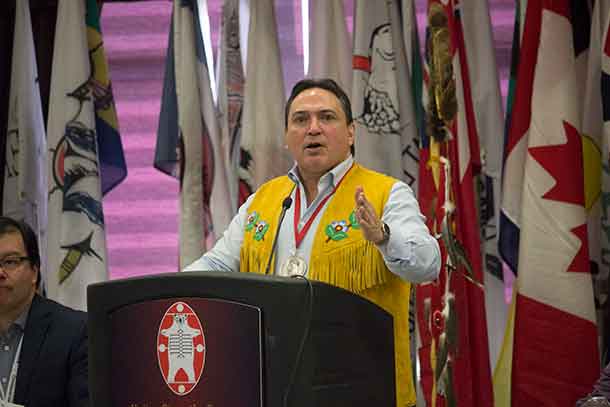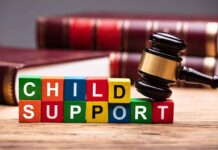
OTTAWA – Indigenous Services Minister Jane Philpott, together with Assembly of First Nations National Chief Perry Bellegarde, Inuit Tapiriit Kanatami President Natan Obed, and Métis National Council President Clément Chartier announced that the Government of Canada will introduce co-developed federal legislation on Indigenous child and family services in early 2019.
“Moving forward with federal legislation on First Nations, Inuit, and Métis Nation child and family services is a vital step toward ensuring Indigenous children are never again forcibly taken from their homes without their parents’ consent. Every possible measure should be taken to prevent Indigenous child apprehension and to reunite children with their families. New federal legislation is a powerful tool to support these efforts,” says Jane Philpott, P.C., M.P. Minister of Indigenous Services.
Indigenous children represent 52.2% of children in foster care in private homes in Canada. The over-representation of First Nations, Inuit and Métis Nation children in the child welfare system is a humanitarian crisis. Indigenous children who have been in care face greater risks of adverse health outcomes, violence and incarceration.
“This is a critical step in supporting the rights and well-being of Indigenous children. The status quo is not acceptable. This proposed legislation will reaffirm the rights of Indigenous children and put in place the much needed supports for communities to ensure that Indigenous children can grow up as proud First Nations, Métis and Inuit with a strong sense of secure personal cultural identity and better health, education and economic outcomes,” stated Carolyn Bennett, M.D., P.C., M.P. Minister of Crown-Indigenous Relations.
“First Nations are ready to reform child and family services in ways that respect our rights, cultures and family structures. First Nations have been held back for years by outdated laws, and we continue to experience the trauma and loss when children and families are broken apart. Legislation, co-developed with First Nations, is an important step toward addressing the need for reform across the entire system. First Nations are ready to focus on prevention over apprehension, and apply First Nations laws, policies and cultural values that place children at the centre of our Nations,” comments Perry Bellegarde, National Chief, Assembly of First Nations.
The Federal Government says that legislation is an important step toward more comprehensive reform.
“Inuit are committed to working constructively and on a distinctions basis towards the co-development of federal child and family welfare legislation to help meaningfully address social inequity in Inuit Nunangat, and across Canada, and ultimately decrease the overrepresentation of Inuit children in care,” says Natan Obed, President, Inuit Tapiriit Kanatami.
This announcement is the culmination of intensive engagements throughout this year which focused on identifying ways to reduce the number of Indigenous children in care. Currently, Indigenous families are bound by rules and systems that are not reflective of their cultures and identities. The goal of the proposed legislation is to change that. It aims to support Indigenous families to raise their children within their homelands and nations as well as increase efforts to prevent child apprehension where possible and safe to do so.
“This proposed legislation will provide a new chapter towards increased recognition that we, the Métis Nation, are best placed to nurture and to care for our children. This is an unprecedented initiative that will ensure the survival, dignity and well-being of our families, communities and nation for generations to come,” according to Clément Chartier, President, Métis National Council.
This broad-based legislation will be inclusive of all Indigenous peoples while respecting a distinctions-based approach. The legislation would affirm inherent Aboriginal and Treaty rights as well as affirm principles consistent with the Calls to Action of the Truth and Reconciliation Commission, the United Nations Declaration on the Rights of Indigenous Peoples, and the United Nations Convention on the Rights of the Child.
A pillar of the legislation will be the right to self-determination of Indigenous peoples to freely determine their laws, policies and practices in relation to Indigenous child and family services.
Throughout 2018, Indigenous Services engaged with national, regional, and community organizations and governments representing First Nations, Inuit and the Métis Nation, as well as Treaty Nations, self-governing First Nations, provinces and territories, experts and people with lived experience, including Elders, Youth and Women. More than 65 engagement sessions with nearly 2,000 participants were held. The message to the government was that legislation could help to protect the best interests of the child.
Quick facts
- Indigenous children represent 52.2% of children in foster care in private homes in Canada but account for only 7.7% of the overall child population.
- The first five Calls to Action by the Truth and Reconciliation Commission relate to child welfare.
- Call to Action #4 calls “upon the federal government to enact Aboriginal child-welfare legislation that establishes national standards for Aboriginal child apprehension and custody cases and includes principles that:
- Affirm the right of Aboriginal governments to establish and maintain their own child-welfare agencies.
- Require all child-welfare agencies and courts to take the residential school legacy into account in their decision making.
- Establish, as an important priority, a requirement that placements of Aboriginal children into temporary and permanent care be culturally appropriate.”
- In 2016, the Canadian Human Rights Tribunal ruled that Canada’s First Nations Child and Family Services Program was discriminatory and ordered Canada to immediately address the issue. The ruling prompted further discussion on the creation of federal legislation as a way to ensure better care for Indigenous children.
- New federal legislation was also called for in an Interim Report by the National Advisory Committee on First Nations Child and Family Services, and in a resolution passed in May of 2018 by the Assembly of First Nations in support of the establishment of federal-enabling legislation for First Nations.
- In January 2018, the federal government held a National Emergency Meeting on First Nation, Inuit, and Métis child and family services with representatives of the Indigenous peoples and nations, the Assembly of First Nations, the Inuit Tapiriit Kanatami and the Métis National Council, Indigenous service organizations, experts and practitioners, elders, grandmothers and youth with lived experience. At this meeting, the Government of Canada announced its commitment to Six Points of Action that included the potential for federal legislation, as called for in TRC Call to Action #4.






